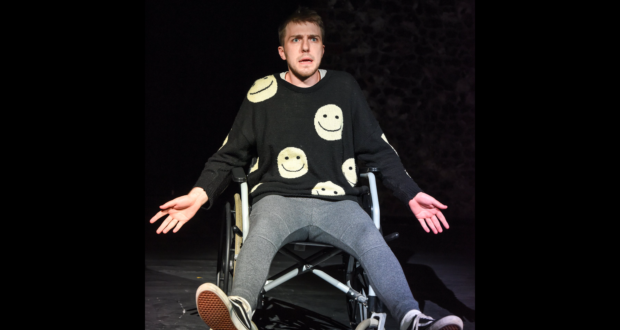What at first glance may seem a simple story of recovery from loss of mobility has much deeper meaning, considering further how society treats those suffering in less visible ways.Summary
Rating
Excellent
The positivity we felt in 2012 at the incredible London Paralympics seems a lifetime and a world away right now. One positive was how society’s attitudes towards disabilities seemed to alter almost overnight. And over the decade since, understandings have been further improved by the representation we now see for disabled people, massively led by the likes of Adam Hills, Alex Brooker and Jonnie Peacock.
But even with this more enlightened outlook, perhaps we still aren’t quite ready to hear writer and performer Sonny Howes’ opening lines about the downside of masturbating when you’re in a wheelchair! It’s certainly quite the start to this funny and thoughtful show. Let’s just say it takes a little more pre-planning if you don’t want to have to wipe your hands on your freshly cleaned wheels.
It’s clear sex is much on Howes’ mind. He is, after all, a typical teenager. Or at least he was, until suddenly in 2012 he lost any feeling in his legs and so spent much of his teenage years – those years in which we’re all desperately trying to lose our virginity – also worrying about learning to walk again.
Howes is a natural storyteller. His delivery is full and clear and pitched perfectly for the moment. At times it is almost Shakespearean in style. You can almost imagine him reciting a monologue whilst holding that famous skull; although given his obsession with sex you’d worry he might just use it as another masturbatory aid! “To be or not to be” might become “to come or not to come, that is the question”. I digress… Even a sudden break into song later on (having just declared this is not a musical) is performed with perfect timing.
Along with fine delivery, Howes’ writing is balanced, allowing the story to flow and taking us through the stages of his recovery whilst also exposing some home truths. As he progresses from wheelchair to Zimmer frame to crutches, finally returning to being what he refers to as a ‘walker’, we realise that in many ways he is just a typical teen; moody, self-centred with a heavy (and maybe at times justifiable) dose of self-pity.
Yet this is not simply his story of recovery and learning to walk again. Rather it is one of realisation that everyone has their own different battles to fight. Subtly interwoven within the narrative are his arguments with his mum, clearly suffering as she tries her best for her son, even if he cannot see this. And then there is best friend Amy and her own struggles with anorexia. Whilst Howes feels sorry for himself for his obvious disability, he is blind to her illness, passing it off with jokes and a lack of understanding or empathy. He instead wallows in self-pity, something others clearly indulge and further reinforce with their sympathy for his visible struggles, whilst ignorant towards those whose suffering is unseen. When Howes describes the argument with Amy that shatters their friendship, her words that “people just tell me to eat something, but they don’t tell you to just get up and walk” is an incredible insight to how we still treat those with mental health issues.
The Benefits of Disabled Sex is a catchy title but not the whole story. This is not a tale about sex; it is an uplifting and positive reflection on growing up, on acceptance and realising that life is tough for everyone, and that just because you might not look vulnerable, you can still be struggling in your own way. Howes is a young storyteller who shows wonderful promise for the future.
Written by: Sonny Howes
Directed by: Uri Roodner and Frankie Golding
Produced by: Rens Tesink for Under The Rug
Sound Design by: Joseph Wood
Lighting Design by: Gareth Stevens
The Benefits of Disabled Sex has completed its current run at VAULT Festival 2023.
 Everything Theatre Reviews, interviews and news for theatre lovers, London and beyond
Everything Theatre Reviews, interviews and news for theatre lovers, London and beyond



